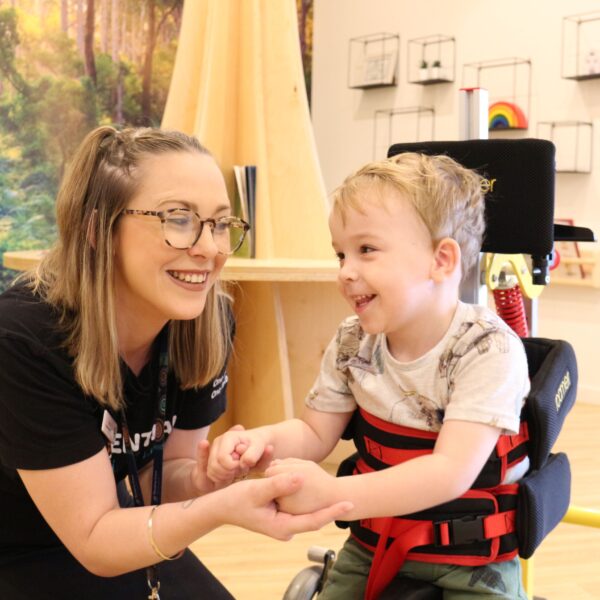How to build positive relationships with families

What do partnerships with families look, feel and sound like in your children’s service? Here are Senior Inclusion Professional Michelle Boudrie’s top 7 tips to help educators build and nurture robust relationships with families.
1. Be genuine
Greet families each morning with genuine warmth. After all, you are taking care of their precious family member. If families see you as welcoming, approachable and as someone who has made an effort to get to know them, they will be much more likely to develop a positive relationship with you.
Actions:
- Keep a list of family members on the door of the storeroom for quick reference.
- Work as a team to ensure an educator is available to greet families by name each day.
- Lead your team by example.
2. Communicate effectively
Effective communication is the foundation of strong partnerships. Benefits include improved relationships, educators having a better understanding of what’s happening at home, and families developing a greater appreciation for the important role you play in their children’s education.
The diversity of families means you will need to use a variety of strategies, adapted to the needs of individuals, to ensure you’re getting your messages across.
Actions:
- Ask each family how they would prefer you to communicate with them (for example, via email, phone or in person).
- There are many ways to communicate – you might like to use a noticeboard, notes in lockers, or perhaps you could make the most of technology by holding virtual meetings, sending email newsletters or using apps like Storypark.
- Be mindful of timing (for example, when a family is too busy to stop and chat at pick-up time, acknowledge how stressful it can be when time is limited).
- Ensure families have clear channels to provide feedback and suggestions.
3. Be curious and ask questions
You can build rapport with families over time by showing interest, sharing anecdotes about their child’s day or providing updates on areas their child is excelling in.
Actions:
- Enquire about a child’s weekend activities – ‘Lilly mentioned she likes to go fishing with her grandfather…’
- Comment on a child’s interests – ‘Ari talks a lot about dinosaurs…’
- Ask family members about themselves – ‘I read your ‘about me’ form and would love to know more about…’
- Share information about yourself – Michael tells me you’re a football fanatic. I play football during the week…’
- Ask about languages spoken at home, cultural traditions or extended family – ‘Do you have family close by?’ or ‘How do you like to celebrate the holidays?’
4. Create clear channels of communication
No family likes to hear that their child needs help. However, challenging conversations are sometimes necessary to develop a common understanding and work together to support a child’s development and wellbeing.
Actions:
- Set times for deeper conversations without distractions.
- Prepare for these conversations by creating an agenda, and sharing notes and handy resources.
- Clearly communicate important information, such as examples of developmentally appropriate behaviours, your team’s expectations and practices, and additional supports that may be helpful.
- For deeper conversations, lead the discussion with understanding and seek information sensitively. For example, ‘Can you tell me a little about Billy’s bedtime routine at home?’
- Set a time to follow up and create opportunities for the family to share their thoughts or concerns.
5. Listen actively
To listen to someone properly, you need to tune in and give them your full attention. Create space and time for families to share information with you and be respectful of each family’s varying degree of openness to share.
Actions:
- Understand that sharing personal information may only occur once the family has built trust in you.
- Consider privacy and where might be a good place to have a sensitive conversation.
- Share your professional knowledge and provide families with the ‘why’ when explaining any concerns you may have about a child.
- Offer websites with educational resources that could help families support their children, such as the Raising Children Network.
- Share how the information a family provides is vital to your work. For example, ‘That information has really helped me to understand how I can support Yasmin during play with her friends’.
6. Prioritise connection
It’s important that families understand you are their partner in their child’s success. For families to be involved in and contribute to their child’s learning, they need to feel part of what you and your team do.
Actions:
- Connect with families through fun Zoom night events that allow more than one family member to attend.
- Introduce family home activities such as ‘How many red items can you see from your dinner table?’
- Set mutually agreed times to meet and talk.
7. Respect diversity
Every child and family deserves to feel they belong in your service. You can champion inclusion by acknowledging and appreciating differences and seeking further information to build your cultural understanding.
Actions:
- With consent from families, create maps of the world with their children’s faces to celebrate the diversity of your community.
- Embed culturally appropriate resources in the room, such as puzzles, home corner equipment, musical instruments, etc.
- Seek keywords in home languages to use for greetings, food references, simple songs, etc.
- Provide specialist equipment, where appropriate, to ensure children with additional needs are meaningfully included (learn more at viac.com.au)
- Link with external organisations, including the Victorian Inclusion Agency, to increase your knowledge and support educator team practices.
- Utilise bicultural support and/or translation services.
- Incorporate pre-enrolment and post-enrolment resources to support communication.
- Critically reflect on your current practices and adopt new ones.
- Develop a Strategic Inclusion Plan to identify your goals and improve your inclusion practices – it’s free! Call 1800 177 017 to get started.
Hint: Pop the relevant actions for your service in your Strategic Inclusion Plan (SIP) under ‘strategies to build positive relationships with families’.
Popular

Workforce
Quality
Research
When did it start to go wrong?
2025-12-18 08:00:46
by Fiona Alston

Quality
Practice
Research
Curiouser and Curiouser: What Alice helps us see about who should teach
2025-12-19 07:15:35
by Contributed Content

Quality
Provider
Research
A call to action for Early Childhood: Accountability and transparency in the National Strategy to prevent child abuse annual report 2025
2025-12-18 07:00:37
by Fiona Alston















